Mista Grasruts (Grassroots), the funniest cartoon character in the South Pacific, is cutting down on his beer, drinking fruit juice and setting a moral example — like his creator. David Robie reports.
By David Robie
Grassroots made quite a name for himself the year he became a “big fella” politician and contested the elections in Papua New Guinea.
He wanted to have his own red carpet. If it was good enough for the Kwin, as he calls the Queen in Tok Pisin (pidgin), it was good enough for him too.
His “people’s independent party of grassrooters” manifesto had simple rules: no running off to other parties, no selling out to overseas interests for less than 700 kina (NZ$308), and one fifth of all bribe money to paid over to the party leader — himself!
- READ MORE: Tribute to creator of much loved Mista Grasruts
- Dog Bites Man: Goodbye Mr Grassroots
- Ting Ting Bilong Mi : Cartoons by Campion Ohasio
Mista Grasruts gave rival politicians a torrid time — when he had a spell from his Six Mile Black Market — greasing the voters and strangely he wasn’t sued.
He was at his irreverent best with Misis Kwin. And Her Majesty loved it. So much so that a set of originals of the Grassroots Letters were sent to Buckingham Palace.

Yet Mr Grassroots, arguably the most popular personality in the South Pacific, won only 325 votes in the 1982 election and failed to get his seat in the Papua New Guinean Parliament. (Much the same happened in 1987, too). But then he is only a cartoon character after all.
Had he been real, there is no doubt that the jovial, enterprising, scruffy, bearded and chain smoking Grassroots would be a remarkable political success in a country where politics revolves around personalities and patronage more than policies.
Hated or loved
Long a celebrity in the PNG Post-Courier, the biggest circulation newspaper [at the time] in Pacific island nations, Grassroots is either hated or loved. Few people fail to be moved strongly by him and his “wantok” (literally onetalk, or brother) friends.
He is a champion of the ordinary villager, or townsfolk, and their everyday lives and grievances.
When a European clergyman criticised Grassroots as the “subtle mockery of a warped colonialist’s mentality and the abusive shame” given to some Papua New Guineans, readers rallied to his defence.
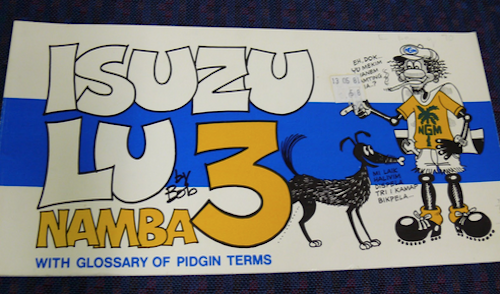
“How come some people can’t see the funny side of things, to even laugh at ourselves?” a Highlands woman from Goroka wrote to the newspaper. “People with no sense of humour should not write such insulting letters.
“I’m rather proud of Roots, that the cartoonist can translate our lives so accurately on to paper. I’m not ashamed of it, neither do I find it abusive. I don’t think the cartoonist has that intent either. We find it entertaining without finding faults and having some weird ideas inside.
“Keep Grassroots in the paper, we love humour — it’s lacking in this crazed world. There’s enough bad feelings around.”
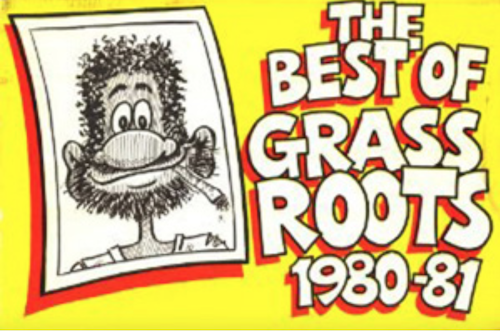
Besides his exposure in the Post-Courier, Grassroots has built up a following through the rest of the Pacific through his cartoons in the Pacific Islands Monthly news magazine and other publications.
The creator
Who is Grassroots’ alter ego, his creator? He is softly spoken, beardless English artist Bob Browne who arrived in Papua New Guinea in 1971 and stayed [Editor’s note: he died in 2011].
On a two-week holiday in Morocco, Browne had faced Third World poverty for the first time. When he returned to London, he joined the the British aid agency Volunteer Service Overseas (VSO) and in 1971 was sent to Papua New Guinea where he went to work with the Catholic Mission as a photographer and designer with Wiriu Press.

Browne produced his first cartoons for Wantok, the first (and only) Tok Pisin newspaper in the world, which was founded by Father Frank Mihalic.
About the same time he began doing his famous Izusu commercial cartoons, which eventually developed into the Grassroots theme.
“There was a rule a work that no English was to be spoken,” recalls Browne, “so I had to learn pidgin and out of necessity I became fluent in about six weeks.”
Grassroots also spoke pidgin most of the time when his cartoons first began appearing on 28 October 1980, but now he mainly speaks English (apart for a weekly educational strip in Tok Pisin).
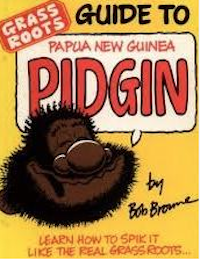
“It’s a reflection that English is more commonly spoken these days, and also that many newspaper readers cannot speak pidgin,” says Browne.
Why the success?
Why is Grassroots, who was born by accident, so successful? Browne believes it is because he and his fellow cartoon characters — such as the saucepan-wielding Agnes and the smarty Charlie — feature “real Papua New Guinea people, saying real Papua New Guinea things”. The amusing sides of Papua New Guinea life result from “many cultures rubbing edge to edge so a lot of funny things happen”.
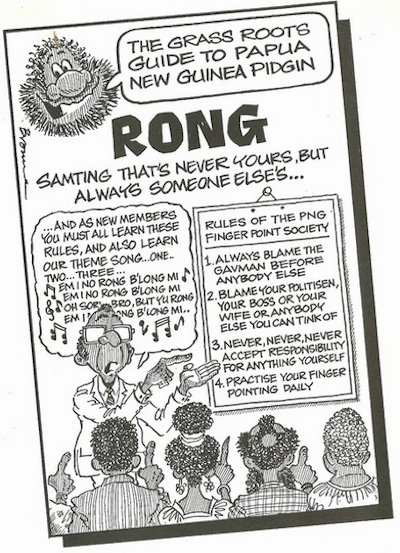
As a cartoonist, Browne treads a fine line between saying something funny and making a point without unfairly savaging somebody.
“I appreciate that most politicians respond by laughing,” he says. “I think it is good for a country as a whole that people can laugh at themselves.”
Many readers have noticed big changes to the character of Grassroots in the last few years — especially in 1987 when he suddenly cut out smoking and began drinking orange juice more than beer. Post-Courier columnist Frank Senge analysed the changes recently, saying that Grassroots had taken to cleaning up his act.
“He has developed a gut, but that isn’t surprising. It is all the litres of beer he has been putting away instead of selling at his Six Mile Black Market. To be fair to the old guy, he isn’t that young anymore,” Senge said.
“His change in behavour is a little harder to place. he has grown almost media-shy. His language has improved dramatically. He has all but stopped drinking.
“I dare say he might be swapping his place at the Six Mile Black Market for a preacher’s pulpit!”
Shaved off his beard
In a recent cartoon, Grassroots shaved off most of his beard and told his mate, “Eh, Charlie . . . it’s me, Grass . . . your mate . . . don’t you recognise me?”
“Grass? Is that really you?” replies Charlie.
“Course it’s me. I know I look clean, but it’s still me . . . honest.”
Charlie: “How do I know for sure?”
Grassroots: “Lend me 10 bucks till next Friday!”
Charlie: “Em nau!! NOW I know it’s you!”
Perhaps the “clean up” isn’t so surprising considering there have been changes going on within the creator, too. Talk to Browne in his studio and you cannot help but notice the biblical quotations on the walls and his evangelical gleam.
Brown confesses that the changds in his life have influence his creation, that he has toned down the more obnoxious habits.
“In the early stages I wasn’t overly concerned about the effect the cartoon had on people. But I became more and more about a cartoon that blasphemed.”
And he felt he couldn’t glorify drunkenness, which had become a serious problem in Papua New Guinea.
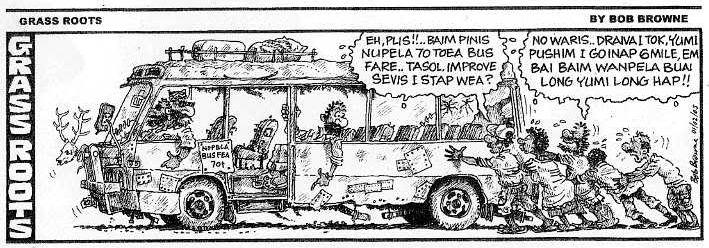
Several cartoonists
These days Browne employs several cartoonists, including a Papua New Guinean. And the strip is a small part of the Grassroots Comic Company’s output — they produce a popular Grassroots calendar, greeting cards and other art work.
Once they used to produce t-shirts as well but there was little profit in that. Several book collections of Grassroots cartoons have also been published.
And while the artists get on with their illustrations, Mr Grassroots carried on with his caustic advice for politicians. He wrote in one cartoon letter:
“Dia Mista Praim Minista Sir,
“Eh, this changing of the mind bisnis it’s not good wan, Bro . . .
“We wanting to make a dil, and we the biggest union in the whole PNG. We the Grassroots Union of Night Traders and we wanting 150 percent inkris on our pay starting neks wik.
“If you’re not fixing it up kwik we closing down all the bilak makets and other nitetime bisnis (you know the wan). Then you’ll be sori!
“Yours, Grass (pres.), G.R.U.N.T.”
This article was first published in New Zealand’s Dominion Sunday Times, 10 December 1990.

